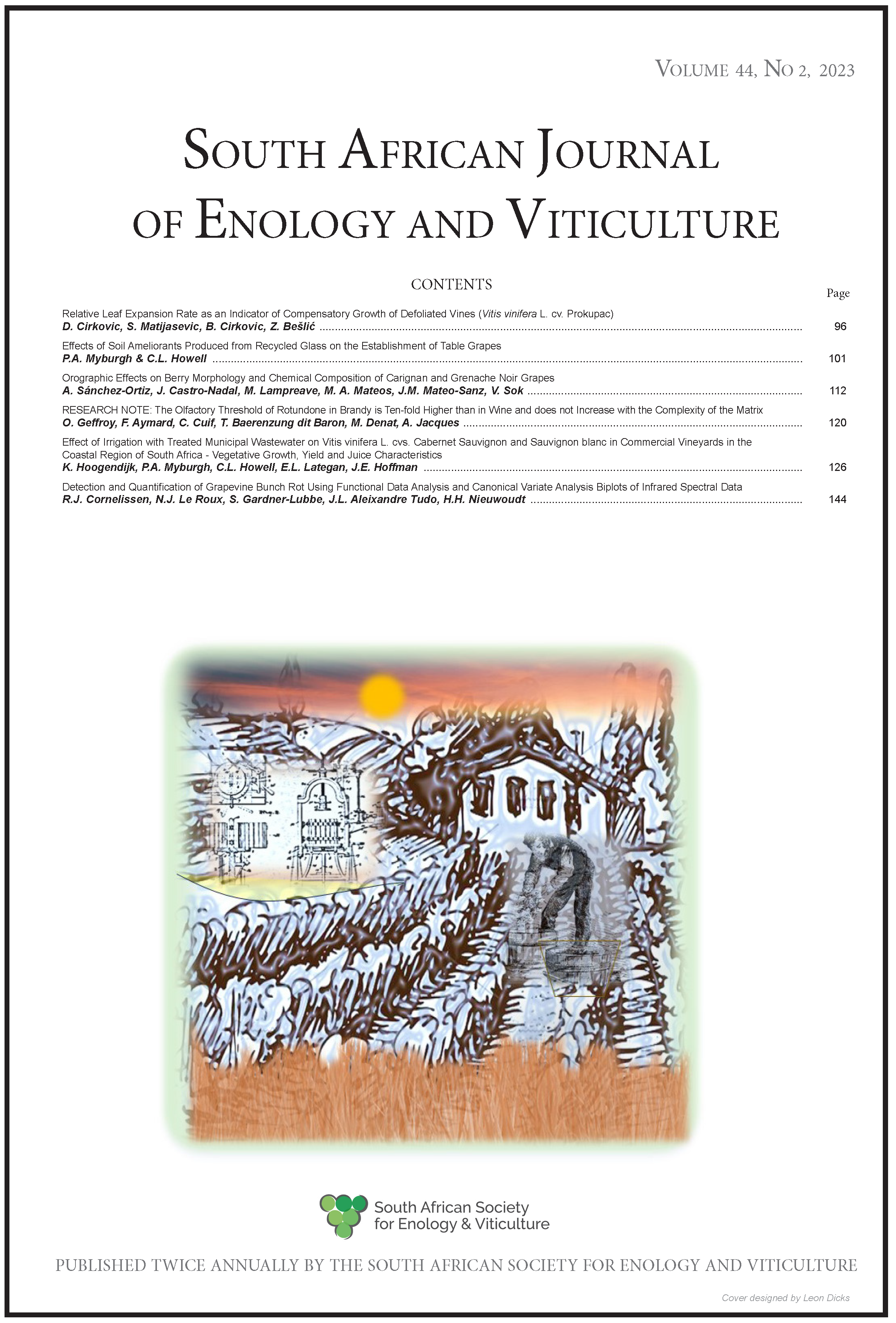Effect of Irrigation with Treated Municipal Wastewater on Vitis vinifera L. cvs. Cabernet Sauvignon and Sauvignon blanc in Commercial Vineyards in the Coastal Region of South Africa - Vegetative Growth, Yield and Juice Characteristics
DOI:
https://doi.org/10.21548/44-2-5871Abstract
A long-term trial was conducted in commercial vineyards in the Coastal region of South Africa to assess the
impact of treated municipal wastewater irrigation on vineyards. Cabernet Sauvignon and Sauvignon blanc
grapevines were irrigated using treated municipal wastewater from the Potsdam wastewater treatment
works for 11 years. Grapevines were either rainfed (RF), irrigated with treated municipal wastewater via
a single dripper line (SLD) or received twice the volume of wastewater via a double dripper line (DLD).
Grapevine responses were measured from the 2013/14 to 2017/18 seasons. Although high amounts of K+,
Na+ and Cl- were applied via wastewater irrigation, it did not result in excessive uptake by plants and
did not affect vegetative growth or yield negatively. Irrigation reduced water constraints throughout the
growing season compared to RF conditions, particularly for Cabernet Sauvignon. Consequently, SLD and
DLD grapevines produced stronger vegetative growth and higher yields compared to RF. Results showed
that the availability of irrigation water (albeit of relatively low quality) in regions where grapevines are
usually grown under dryland conditions can increase grapevine productivity whilst maintaining good
fruit quality. However, the water can vary in its availability as well as its quality over a short period of
time. Plant and soil water status should be monitored regularly to avoid over-irrigation. Implementing
low frequency irrigation scheduling with a sufficient leaching fraction will allow adequate time between
irrigation applications for soils to aerate and organic material to decompose. Irrigation water, soils
and grapevine leaves should be analysed to ensure that chemical parameters conform to recommended
thresholds and norms.
Downloads
Downloads
Published
How to Cite
Issue
Section
License
A copyright form will be e-mailed to the corresponding author when the manuscript has been accepted for publication.
In principle, the Author agrees to the following when he/she signes the copyright agreement:
I hereby assign to the SOUTH AFRICAN SOCIETY FOR ENOLOGY AND VITICULTURE (SASEV) the copyright of the text, tables, figures, supplementary material, illustrations and other information (the Material) submitted with the manuscript to be published in SOUTH AFRICAN JOURNAL OF ENOLOGY AND VITICULTURE (SAJEV) (the "Article"). The copyright becomes effective from the date the Article has been accepted for publication in SAJEV.
This is an open access journal, and the authors and journal should be properly acknowledged, when works are cited.
Author's may use the publishers version for teaching purposes, in books, theses, dissertations, conferences and conference papers.
A copy of the authors' publishers version may also be hosted on the following websites:
- Non-commercial personal webpage or blog.
- Institutional webpage.
- Authors Institutional Repository.
The following notice should accompany such a posting on the website: This is an electronic version of an article published in SAJEV, Volume XXX, number XXX, pages XXX - XXX, DOI. Authors should also supply a hyperlink to the original paper or indicate where the original paper (www.journals.ac.za/index.php/sajev/) may be found.
Authors publishers version, affiliated with the Stellenbosch University will be automatically deposited in the University's Institutional Repository SUNScholar.
Articles as a whole, may not be re-published with another journal.
The following license applies:
Attribution CC BY-NC-ND 4.0

